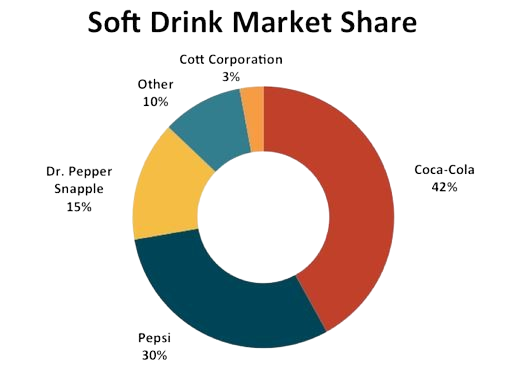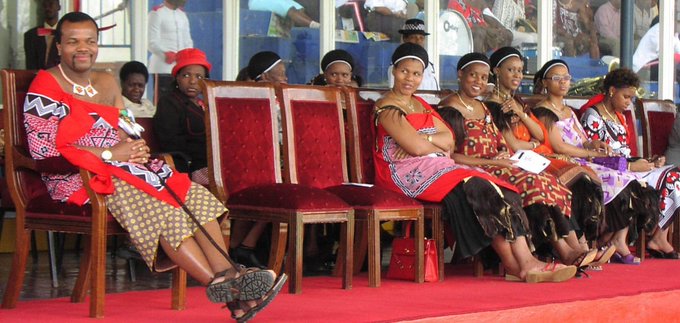As inequality persists, we eventually end up with either two giants and many dwarfs, or all dwarfs disappear, leaving only two giants and barely one dwarf surviving in the world.
Let’s look at a more realistic market. Although it seems like many companies are competing in the markets we encounter, in the end, there are only two leaders, the giants in first and second place, a distant third place, and very small companies that remain. The very small companies that do remain are either operating in markets too small for the top three giants to enter, or they are suppliers of parts to these giants. Jagdish Sheth and Rajendra Sisodia, authors of ‘The Rule of Three’, refer to these small companies as specialists, while the big three are naturally called generalists.
What about the soft drink market? Not just in the United States but globally, it has become a battle of the two giants, Coca-Cola and PepsiCo. Once, Korea had its own cola brand, ‘8.15 Cola’, which called for independence but eventually was pushed out of the market. The situation is similar in Korea’s telecommunications market. Although competitors such as Shinsegi Hansol once existed, now only SK, KTF, and LG remain in the market, holding shares of 51%, 32%, and 17% respectively. Do you remember the advertising slogan, ‘Well done, Lycos!’? It was one of the companies that spent a lot on advertisements in the portal site competition. However, it is no longer seen. Today in our country, only Naver, Daum, and a few other portals exist.

Until recently, the leading automobile companies in the United States were GM, Ford, and Chrysler. By the late 1920s, there were over 500 car companies fiercely competing in the U.S. As is well known, only the Big Three—GM, Ford, and Chrysler—remained, with Chrysler now barely maintaining its legacy as part of the multinational Stellantis group. Similarly, in the global footwear manufacturing industry, companies like Nike, Adidas, and Reebok are prominent. Moreover, in various other industries such as beer, beverages, aircraft manufacturing, and telecommunications, a few companies dominate more than 70% of the market. Is it merely a coincidence that in each industry, the iconic leaders are typically three in number?

What about politics? Everyone is free to participate in politics and form political parties, yet in every country, there are two major parties and numerous minor parties. Politics, while often invoking various justifications, is essentially about competing for limited resources. The principle of competition and the pursuit of efficiency in the market always result in inequality. Whenever a new market emerges in any industry, a competitive system naturally begins to operate. In the early stages of the industry, numerous competitors start fiercely vying for survival. Over time, the principle of survival of the fittest leads to the elimination of inefficient companies, leaving only a few efficient ones.
In sociology, there is something known as conflict theory. It might sound like a special theory, but essentially, it views the problem of distribution surrounding scarce resources as the core of human affairs. Who gets a larger share has been a primary conflict since societies were formed.
The League of Selfish Networks
People always cry out for equality. However, the world is always unequal. The atmosphere we breathe is made up of over 78% nitrogen, 20% oxygen, and a very small amount of many other elements. Even towering buildings are supported by just a few pillars. The internet, though conceived as a decentralized network, naturally produced leaders known as hub sites. In human societies, whether they like it or not, leaders exist.
The world is made up of networks. Every living being is part of a network. Humans are structured in networks, and human memories are stored in the form of networks. This network consists of numerous components that interact and change. Scientists call this network a complex system. A complex system is simply many components that are constantly interacting. Most of the world, including subways, global airline networks, and the internet, are complex systems. Nations, cities, economic systems, and organizations composed of numerous people are also examples of everyday complex systems.
A network presupposes interaction. The addition of just one new component can create a vast number of new links, as many new connections as there are existing members. Consider the case of a new airport establishing new routes with all existing airports. Without interaction among members, however extensive the components, there would be no complexity.
Yet, we find that two leaders are always formed within such networks, and they change through competition and cooperation. In the internet, leaders are the so-called hub sites. In portal sites, Naver and Daum are leaders, with numerous other sites vying to be leaders. Human societies also exhibit this network form, with informal leaders or tournament leaders around whom many people revolve.
A leader is necessary for any organization or society to function efficiently. However, the problem arises when a leader loses capability, but the system persists for a while. Imagine the internet centered around hubs. If a hub is lifted up, other sites are arranged below it. This forms a pyramid shape, similar to an organizational chart of an army or a company.
If enough freedom is provided, incompetent leaders who do not contribute to the organization will be replaced, and a new network will be formed. However, real society does not work this way. Once someone belongs to the upper echelon of a tournament, an exclusive ‘league of their own’ is formed. Members of this league cooperate to perpetuate their status and obstruct others from entering their league. They also create a system that allows them to take more and keep it for longer than is justified.
According to the theory of tournaments, the excessively high salaries of CEOs can be justified as motivation for lower-level employees. However, these high salaries are not only a result of tournament-style competition but are also created by their exclusive league. This is similar in Korea, but in the U.S., bank CEOs, financial regulators, government bureaucrats, and supervisory agency officials all belong to the same network and league. Cooperating to increase each other’s income and power helps them as well. In essence, they are asking each other, “Aren’t we all in this together?” Inequality can worsen as market entry barriers are erected. Although members might not know when they will move to another position within the league, they would not refuse the increased resources they enjoy together. More lavish parties, more expensive lunches, and more luxurious offices are all created this way.

The Kingdom of Swaziland, also known as Umbuso weSwatini, is relatively prosperous compared to other African nations, but with a GDP per capita of about $5,000, it ranks 101st in the world and suffers from severe wealth disparity. King Mswati III, who ascended to the throne at age 30, currently has 15 wives and appears likely to marry more. This is because each year, an event takes place where teenage girls dance semi-nude before the king, hoping to become one of his wives. In 2009, about 70,000 teenage girls participated in this event.
Islamic countries also generally accept polygamy as a norm. The rationale is often to support women who would struggle to live on their own, but resources are seldom distributed freely to those who have less. Their “league of their own” is not only closed off but also highly selfish. Although occasionally a new strong member is accepted into their league, it is a rare event, and the new member also begins to cooperate with them. Thus, society is always divided into at least two leagues: those who have and those who do not, leading to ongoing conflict and strife.
Every society demands a variety of leaders who also take on those roles. Pareto, who introduced the 80/20 rule of inequality, called such leaders elites. Originally, the term ‘elite’ referred to the best or finest in terms of products or people, but it gradually came to mean leaders who possess a combination of creativity, responsibility, mission, and capability. For Pareto, an elite is someone who scores the highest in any field. For example, even the most skillful thief is considered an elite, meaning he is essentially a ruler or leader. If this leader fails to perform their role, a new leader must emerge. The problem is that a league of their own, similar to the monarchs and lords of the past, still exists.
Our history has always been divided between rulers and the ruled. In our country, until recently, nobles and yangbans created many systems and institutions for their own benefit. India’s caste system is slowly changing with economic development but still distinctly exists in Indian society. Privileged classes always claim to uphold the interests of the whole society to justify their special interests, but in reality, they cling to the benefits before them.
Karl Marx addressed the issue of who benefits more from the value produced by capitalists and workers. Specifically, he believed that capitalists exploit the value created by workers under the guise of capital gains. Thus, he classified capitalists and workers as the propertied and propertyless classes. Although Marx did not divide society strictly into haves and have-nots, Max Weber also recognized such conflicts. However, Weber believed that societal structure is influenced by various social variables like status, power, and wealth, not just economics. Therefore, the conflicts Weber emphasized are not just between classes but also between status groups.

Today, this competition continues. Today’s emerging aristocrats are corporate owners, like conglomerates. Jean Ziegler, author of “L’empire de la honte(The Empire of Shame)” and advisor to the UN Human Rights Council, points out that the world is being feudalized again by multinational corporations. These emerging feudal lords are multinational corporations. America is called the land of opportunity, where one can succeed through skill and effort. However, this isn’t entirely true. Even in relatively socially mobile America, it’s undeniable that it is an elite society. Occasionally, exceptionally capable individuals like Obama enter the elite society, but closed societies do not easily open up.
As power, wealth, and information become concentrated, those who cannot participate in their network must adapt to the rules they create and undergo tournament-style competition. Leaders in each field of society occupy the highest positions in these tournaments and enjoy those positions. No one will easily give up their place for the overall efficiency of the group. Moreover, if leaders from different fields create another network across their unique domains, changing leaders becomes even more difficult.
For those trying to enter the network from the lower levels of the tournament, it is increasingly a sad affair. For example, the leader group in society—corporate owners, top executives, senior politicians, and famous figures in culture or arts—can interact and form another network to collaborate.
Their positions are not hereditary like in ancient times. However, those who can access their network end up holding an unfair seed in our so-called tournament and are likely to support those who are cooperative or from the same social background. This conflict isn’t just between classes. Once part of the upper tier in any field, there is an effort to create barriers to protect their market. The same applies in academia. Scholars also must undergo tournament competition, and once they reach a higher level, they create closed networks. Whether intentional or not, economics determines ranking through mathematical ability. The same applies in the humanities. To gain recognition, one must know how to use their specialized terminology. Ultimately, participants in the tournament who do not understand their language must spend more time learning it.

People compete and cooperate for their own interests, yet they may refuse to cooperate when immediate benefits are visible. Even when they do cooperate, it is often a selfish cooperation among themselves, serving their own interests. This is known as collective selfishness. We are not here to criticize such a society; rather, we point out that this kind of selfish cooperation and collective selfishness still exists in our increasingly narrow world. It is a reality. Collective selfishness is one of the significant phenomena explaining our society, much like the “selfish gene.” Reinhold Niebuhr, whose book “Moral Man and Immoral Society,” published in 1932 and chosen by Time magazine as one of the 100 best books of the 20th century, states, “Even morally upright individuals become collective egoists when they belong to a group.” Imagine, then, how much more selfish a group composed solely of selfish individuals would be.


답글 남기기